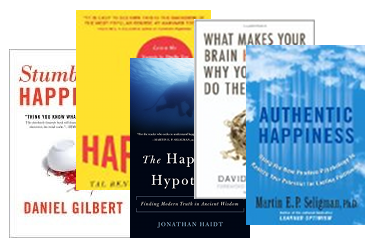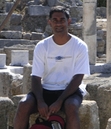Beyond Happiness
Last week, during one of my web browsing...

Beyond Happiness
Last week, during one of my web browsing sessions looking for interesting material to read, I came across an article that had been published in the New York Times more than a year ago. The title intrigued me: “A New Gauge to See What’s Beyond Happiness.” It appeared on May 16, 2011. I was surprised I had missed it at that time, because I read the New York Times every day and also because the subject of happiness - what it is, how to get it, how to keep it - intrigues me.
Many books have been published on this subject, of course, and I own a few of them. Dan Gilbert, a Harvard psychologist, wrote that humans tend to overestimate the effect of perceived future loss, and also perceived future happiness. In other words, we tend to think of the future as worse than we would actually experience it to be when it arrives (if I am unemployed I will die), and better than it would be when we imagine something that we think would make us extremely happy (winning the lottery is fine, but very soon we go back to right where we were before). That is, we are great at adapting to highs and lows, in a way that essentially results in a flat line of “being”. This leads me to believe we are born with an innate disposition to be happy at some level, and while to some extent this level can rise or fall because of the environment, the difference is rather small.
In “Happier: Learn the Secrets To Daily Joy and Lasting Fulfillment”, Tal Ben-Shahar defines happiness as the overall experience of pleasure and meaning. His book arose out of a positive psychology course he taught at Harvard. More on positive psychology when we check in with Martin Seligman, who more or less invented the discipline (or quasi-discipline) of “positive psychology”, and who is the subject of the article with which I led this post. For now, the question that arises is: how do we measure the overall experience of pleasure and meaning. How much of it do we need to be happy? I read through Happier expecting some deep insight, but didn’t really get that much. It is worth noting thought that Ben-Shahar makes meaning an integral part of happiness: how meaningful we think our life is has a lot to do with how happy we are.
I won’t go into the details of the other books I have read or skimmed through, but I should note them here because they did hold my attention enough to justify their purchase. There’s Jonathan Haidt’s, “The Happiness Hypothesis: Finding Modern Truth in Ancient Wisdom”. Haidt is a social psychologist, and his approach to finding what happiness is all about and how to be happy lies in going back to the teachings and writings of the ancients. To which I ask the question: would the ancients have been as happy had they access to smartphones and Facebook? David DiSalvo takes a neuro-cognitive tack in his quest to unravel the secrets of happiness. His “What Makes Your Brain Happy and Why You Should Do the Opposite,” examines the conflict between the power of hardwired behavior (instinct) and rational overrides, and suggests that we have to take charge and steer our brain toward happiness in a very conscious manner. Sort of like the Buddhist “mindful awareness.” Automatic response is out, calculated action is in.
Finally, we arrive at Seligman’s, “Authentic Happiness”. The sub-title of the book is, “Using the New Positive Psychology to Realize Your Potential for Lasting Fulfillment.” Seligman originated the “positive psychology” movement, and this book details what the movement is all about. The takeaway from this book is his happiness formula:
H = S + C + V
where H is your enduring level of happiness, S is your set range (genetically predisposed), C is the circumstance of your life, and V represents factors under your voluntary control. According to him, about 50% of how happy we are (enduringly) depends on our genes, and cannot be changes. That’s a hefty proportion!
Now, back to the article I started out with. Seligman now thinks that happiness is overrated!! Now wait a minute. Does this mean the pursuing happiness would be barking up the wrong tree? Apparently Seligman now regrets the title “Authentic Happiness” he gave to his book. I want to jump to the end of that article, where Seligman is quoted as saying: “One’s job as a therapist is not to change what people value, but given what they value, to make them better at it.”
So, in a nutshell, we have been thinking about happiness all wrong. Everyone is not happy in the same way. There is no universal prescription for happiness. You have to find what “values” or goals (being the best swimmer in the world, or being the best mother you can be, etc.) you care most about, and do your darnest to live by them. As simple as that.
I’ll leave you with another intriguing thought. Paul Theroux opens his book “My Secret History”, like this: I was born poor in rich America, yet my secret instincts were better than money and were for me a source of power. I had advantages that no one could take away from me—a clear memory and brilliant dreams and a knack for knowing when I was happy.
Do you actually know you are happy when you are happy? Or is it always a thing of the past. “Oh yeah, those were the happiest days of my life.”



